|
|
|
Sort Order |
|
|
|
Items / Page
|
|
|
|
|
|
|
| Srl | Item |
| 1 |
ID:
138794
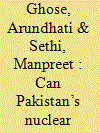

|
|
|
|
|
| Summary/Abstract |
Mark Fitzpatrick, a non-proliferation analyst at the International Institute for Strategic Studies (IISS) in London, is among the latest to hazard solutions to Pakistan’s nuclear dangers and myriad other problems. In his Adelphi book, Overcoming Pakistan’s Nuclear Dangers, he identifies four specific dangers presented by Pakistan’s nuclear programme: the potential for
nuclear use; for a nuclear arms race; for nuclear terrorism; and for onward proliferation and nuclear accidents. After an assessment of each danger, he proffers three recommendations, among them the ‘nuclear normalisation’ of Pakistan, defined as offering the country a nuclear-cooperation deal ‘akin to’ the one given to India in 2008.
|
|
|
|
|
|
|
|
|
|
|
|
|
|
|
|
| 2 |
ID:
138793
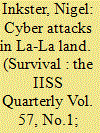

|
|
|
|
|
| Summary/Abstract |
Hollywood has not been slow to appreciate and exploit the cinematic potential of the threat from cyber attacks. Films such as Live Free or Die Hard contain graphic depictions of the chaos caused when hackers take control of US transportation networks, the stock market and natural-gas and power grids on the Eastern Seaboard. Hollywood did not, however, anticipate that it would become the target of the first-ever alleged state-sponsored destructive computer-network attack to take place on US soil – and that by virtue of this fact it would find itself, not for the first time, playing the role of a major national-security actor.
|
|
|
|
|
|
|
|
|
|
|
|
|
|
|
|
| 3 |
ID:
138792
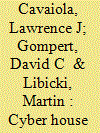

|
|
|
|
|
| Summary/Abstract |
When it comes to cyber war, the United States is ambivalent. While persuaded of the utility of offensive cyber operations, it dreads where they might lead. The advantages of cyber war are swamped by the disadvantages if it cannot be kept under control – and there are nagging doubts about whether it can. That computer systems are often interconnected and ultipurpose,
and that there are no sharp ‘firebreaks’ in cyber war, compounds the dangers of escalation to unintended levels and effects, including the disruption of critical civilian services. In a crisis or war, the United States might, despite misgivings, feel compelled to attack computer systems that enable the enemy to strike US forces, only to find itself engaged in cycles of attack and retaliation that produce more pain than gain.
|
|
|
|
|
|
|
|
|
|
|
|
|
|
|
|
| 4 |
ID:
138790
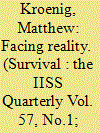

|
|
|
|
|
| Summary/Abstract |
Russia’s annexation of Crimea, invasion of Donbas, and continued threats to Ukraine and other European countries not only menace the stability of the post-Cold War order in Europe, but also pose a fundamental challenge to the assumptions about the strategic environment that have undergirded the NATO alliance for the past quarter of a century.
|
|
|
|
|
|
|
|
|
|
|
|
|
|
|
|
| 5 |
ID:
138796
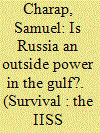

|
|
|
|
|
| Summary/Abstract |
When Russia is invoked in analysis of outside powers’ role in the Middle East, it is often thought of in two related ways: either as a shrunken Soviet Union or as a potential regional security guarantor should the United States abdicate that role. Following the 2013 IISS Manama Dialogue, a Gulf leader was quoted as saying: ‘the Russians have proved they are reliable friends … As a result, some states in the region have already started to look at developing
more multilateral relations, rather than just relying on Washington.
|
|
|
|
|
|
|
|
|
|
|
|
|
|
|
|
| 6 |
ID:
138795


|
|
|
|
|
| Summary/Abstract |
The non-proliferation regime’s long-running discrimination against Pakistan peaked in 2008, when the 48 member states of the Nuclear Suppliers Group (NSG) granted an exceptional trade waiver to India. The group’s application of country-specific criteria for civil nuclear-technology cooperation has the potential to erode its credibility, and suggests the regime operates on the principle that, as George Orwell wrote, ‘all animals are equal, but some animals are more equal than others’.
|
|
|
|
|
|
|
|
|
|
|
|
|
|
|
|
| 7 |
ID:
138791


|
|
|
|
|
| Summary/Abstract |
We Shall Beat Our Swords Into Plowshares’, reads the inscription on a bronze statue presented by the Soviet Union to the United Nations in 1959, permanently installed in front of UN Headquarters on the East River. Symbolising the struggle for peace, it was sculpted by a Ukrainian, Evgeny Vuchetich. The road to peace after the erection of the monument in New York was bumpy, to say the least, but by 1990 the goal seemed to be in sight.
|
|
|
|
|
|
|
|
|
|
|
|
|
|
|
|
| 8 |
ID:
138789
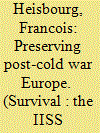

|
|
|
|
|
| Summary/Abstract |
During the two decades preceding the Russian annexation of Crimea, Western powers did not have a comprehensive strategy towards Russia because they perceived no need to devise one. The West did have a full-spectrum strategy for inclusion of the former members of the Warsaw Pact and the Baltic States into NATO and the European Union, to create a trategically and societally unified space in a ‘Europe whole and free’.
|
|
|
|
|
|
|
|
|
|
|
|
|
|
|
|
| 9 |
ID:
138788


|
|
|
|
|
| Summary/Abstract |
Strategy is a much debated notion, and there are some who doubt whether it is possible or desirable to have a coherent, grand strategy, or even a central strategic concept such as ‘containment’, in today’s global environment. The literature on strategic thought has grown even as the challenges to intellectual coherence have multiplied.
|
|
|
|
|
|
|
|
|
|
|
|
|
|
|
|
|
|
|
|
|